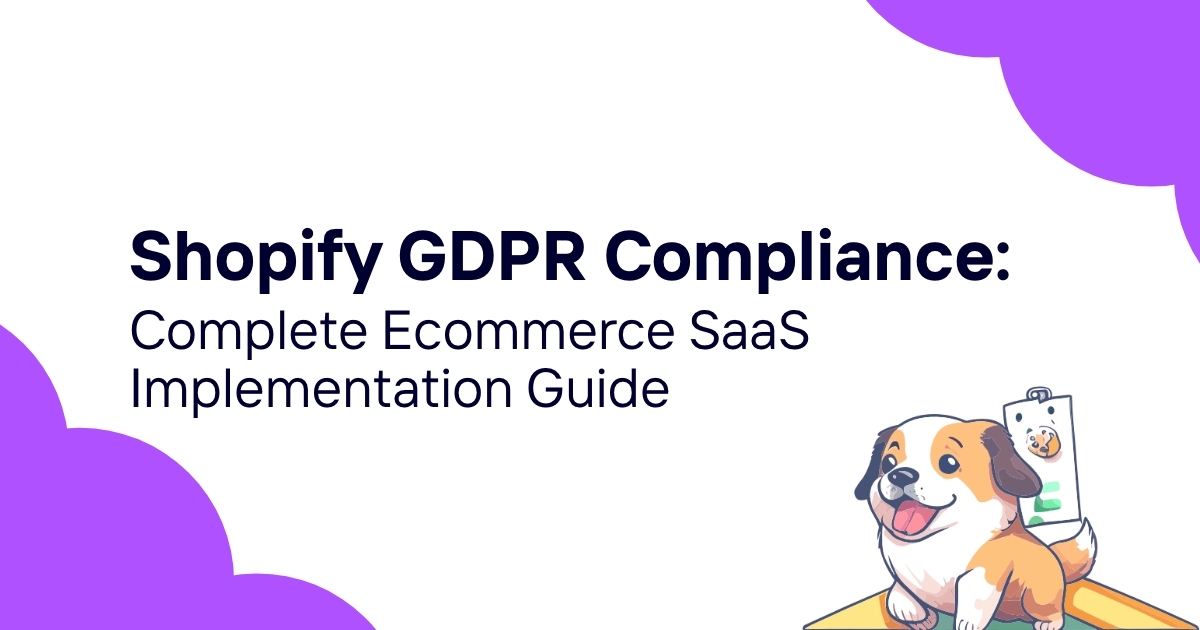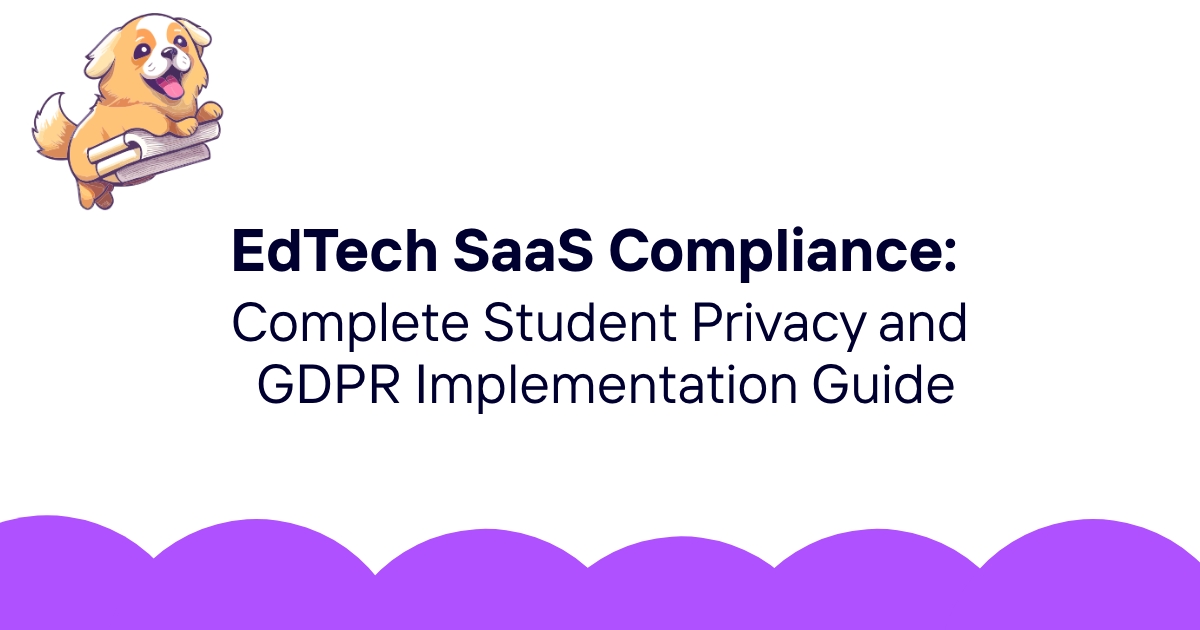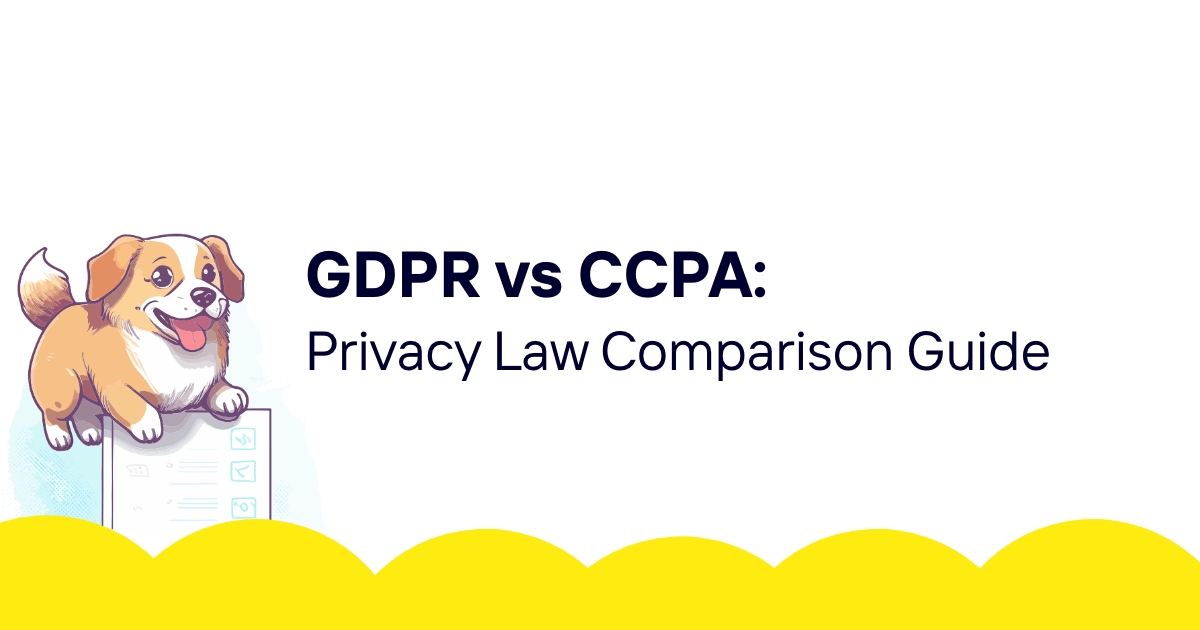Shopify store owners operating in international markets face complex GDPR compliance challenges that go far beyond Shopify's built-in privacy features. While Shopify provides foundational compliance tools, creating comprehensive GDPR compliance requires understanding how customer data flows through themes, apps, payment processors, and marketing integrations that make up modern ecommerce operations.
The challenge isn't just implementing Shopify's native GDPR features - it's ensuring every component of your ecommerce ecosystem respects European privacy rights. Third-party apps, tracking pixels, email marketing integrations, and analytics tools each create potential compliance gaps that can expose stores to regulatory risks and customer complaints.
GDPR compliance for Shopify stores requires coordinated implementation across multiple touchpoints including checkout processes, customer accounts, marketing automation, and post-purchase communication. Each interaction with European customers creates data processing obligations that must be carefully managed throughout the customer lifecycle.
Successful Shopify GDPR compliance transforms privacy protection from compliance burden into competitive advantage. Stores that demonstrate transparent data practices build stronger customer trust, reduce cart abandonment from privacy concerns, and position themselves for success in European markets where privacy-conscious consumers increasingly choose brands based on data protection practices.
ComplyDog helps Shopify store owners build comprehensive GDPR compliance that goes beyond basic privacy policies to create systematic privacy protection across all ecommerce operations and third-party integrations.
Shopify GDPR Requirements for Store Owners
Shopify provides foundational GDPR tools, but store owners remain responsible for comprehensive compliance that addresses their specific business model, apps, and customer interactions.
Shopify's Built-in GDPR Features:
Shopify includes several GDPR compliance features including customer data request handling, automatic data deletion after account closure, and privacy policy templates that provide starting points for compliance.
However, these features only cover basic Shopify functionality and don't address third-party apps, custom tracking implementations, or marketing integrations that most stores depend on for growth and customer engagement.
Store Owner GDPR Responsibilities:
Store owners act as data controllers under GDPR, making them responsible for all personal data processing that occurs through their Shopify stores including data collected by apps, themes, and integrations they choose to implement.
This responsibility includes ensuring lawful basis for data processing, implementing appropriate security measures, responding to customer rights requests, and coordinating compliance across all store components and service providers.
Legal Basis for Ecommerce Processing:
Ecommerce stores typically rely on multiple legal bases including contract performance for order fulfillment, legitimate interests for fraud prevention, and consent for marketing communications and non-essential tracking.
Document your legal basis for different processing activities clearly, ensuring customers understand why their data is collected and how different legal bases affect their rights and choices.
Data Protection Impact Assessments:
Consider whether your store's data processing activities require formal Data Protection Impact Assessments, particularly if you use extensive customer profiling, automated decision-making, or process large volumes of personal data.
High-risk processing activities including detailed behavioral tracking, automated pricing decisions, or extensive customer profiling might require formal privacy impact assessments and additional safeguards.
Vendor and App Management:
Store owners remain responsible for GDPR compliance even when using third-party apps and services, requiring due diligence on app privacy practices and appropriate data processing agreements with service providers.
For insights on managing comprehensive ecommerce compliance, check out our India DPDP compliance guide which addresses similar multi-component compliance challenges.
Customer Data Collection and Processing on Shopify
Shopify stores collect extensive customer data through multiple touchpoints that each require GDPR compliance consideration and appropriate privacy protection implementation.
Customer Account Data:
Shopify customer accounts collect names, email addresses, shipping addresses, phone numbers, and order history that require clear privacy notices and appropriate retention management.
Implement account creation processes that provide clear information about data collection purposes while offering granular privacy choices for different account features and communications.
Checkout Data Processing:
The checkout process collects payment information, billing details, and delivery preferences that require secure handling and clear communication about data processing purposes and retention.
Design checkout flows that collect only necessary information for order fulfillment while providing clear explanations of data use and storage that don't create friction in the purchase process.
Customer Behavior Tracking:
Shopify stores often implement extensive behavior tracking through analytics, heatmaps, and conversion optimization tools that collect detailed information about customer browsing and shopping patterns.
Evaluate behavioral tracking tools for GDPR compliance, implementing appropriate consent mechanisms for non-essential tracking while maintaining legitimate analytics for business operations.
Marketing Data Collection:
Email marketing, abandoned cart recovery, and customer segmentation often involve extensive data collection and automated processing that requires consent management and clear privacy communication.
Implement marketing data collection with granular consent options that allow customers to choose marketing preferences while supporting legitimate business communications and customer service.
Customer Support Data:
Customer service interactions through chat, email, and phone create personal data that requires appropriate retention policies, access controls, and privacy protection throughout the support process.
Design customer support data handling that balances service quality with privacy protection, implementing appropriate retention limits and access controls for support interaction data.
Shopify Cookie Consent Implementation Guide
Cookie compliance for Shopify stores requires comprehensive implementation that addresses both Shopify's built-in cookies and third-party cookies from apps, analytics, and marketing tools.
Essential vs Non-Essential Cookies:
Shopify uses essential cookies for cart functionality, security, and basic site operation that don't require consent, but most stores also implement non-essential cookies for analytics, marketing, and personalization.
Audit all cookies used by your store including Shopify's cookies, app cookies, and custom tracking implementations to categorize them appropriately and implement required consent mechanisms.
Cookie Consent Implementation:
Implement cookie consent banners that provide clear information about cookie categories and allow granular consent choices while maintaining site functionality for users who decline non-essential cookies.
Design consent interfaces that comply with GDPR requirements for specific, informed consent while providing user-friendly experiences that don't create excessive friction for site visitors.
Cookie Blocking Implementation:
Implement technical measures that prevent non-essential cookies from loading until appropriate consent is obtained, ensuring compliance with GDPR's requirement for consent before processing.
Consider cookie consent management platforms that can automatically block and release cookies based on user consent decisions while maintaining site functionality and user experience.
Third-Party Cookie Management:
Many Shopify apps and integrations set their own cookies that must be managed through your consent implementation, requiring coordination with app developers and service providers.
Maintain inventories of all third-party cookies and tracking technologies used by your store, ensuring appropriate consent management and privacy disclosure for all tracking activities.
Consent Documentation:
Maintain records of cookie consent decisions including what cookies users consented to, when consent was obtained, and how consent information was presented to demonstrate GDPR compliance.
Implement consent logging that provides sufficient detail for compliance demonstration while respecting user privacy and supporting consent withdrawal management.
Shopify App GDPR Compliance Management
Third-party Shopify apps create significant GDPR compliance challenges because each app potentially collects and processes customer data that store owners remain responsible for protecting.
App Privacy Assessment:
Evaluate all installed apps for GDPR compliance including data collection practices, processing purposes, security measures, and privacy policy quality before installation and during regular reviews.
Create app evaluation checklists that address GDPR requirements including data minimization, consent management, customer rights support, and security protection for customer data.
Data Processing Agreements:
Ensure apps that process customer data on your behalf have appropriate data processing agreements that define roles, responsibilities, and compliance obligations under GDPR.
Many app developers provide standard DPAs, but store owners should ensure agreements address specific data processing activities and compliance requirements for their particular use cases.
App Permission Management:
Shopify's app permission system controls what data apps can access, but store owners must ensure apps only receive data necessary for their specific functionality and business purposes.
Regularly review app permissions and remove access for apps that are no longer needed or that request more data access than necessary for their stated functionality.
Customer Consent for Apps:
Some apps require separate customer consent for data processing that goes beyond essential ecommerce functionality, particularly for marketing, analytics, and personalization features.
Implement consent management that addresses app-specific data processing while providing customers with clear information about what apps process their data and for what purposes.
App Data Retention:
Coordinate with app developers to ensure customer data retention policies align with GDPR requirements and your store's retention practices, including data deletion when customers exercise deletion rights.
Document app data retention practices and ensure mechanisms exist for coordinating customer rights requests across all apps that process customer data.
Customer Data Rights Management in Shopify
GDPR customer rights require systematic implementation that goes beyond Shopify's basic tools to address all data processing activities across apps, integrations, and custom implementations.
Data Subject Access Requests:
Implement systems that can compile comprehensive customer data from Shopify, apps, and integrations to provide complete responses to access requests that satisfy GDPR requirements.
Shopify provides basic data export tools, but comprehensive access requests require coordinating data from multiple sources including email marketing platforms, analytics tools, and customer service systems.
Data Portability Implementation:
Create data portability systems that provide customer data in useful formats that support migration to other platforms while protecting business intellectual property and other customers' information.
Consider what data customers would actually want to port including order history, account preferences, and communication history while ensuring exports don't contain business confidential information.
Data Deletion Coordination:
Implement deletion processes that can remove customer data from Shopify, connected apps, and integrated services while preserving information necessary for legal compliance and business operations.
Coordinate deletion requests across all systems that process customer data, ensuring comprehensive removal while maintaining necessary records for tax compliance, dispute resolution, and fraud prevention.
Correction and Update Management:
Provide mechanisms for customers to correct inaccurate personal data across all systems while maintaining data consistency between Shopify and integrated platforms.
Design correction workflows that can update customer information across multiple systems while maintaining data integrity and appropriate audit trails for changes.
Rights Request Automation:
Consider automated tools that can streamline customer rights processing while ensuring comprehensive coverage of all data processing activities and appropriate verification procedures.
Automation can improve response times and consistency while reducing manual effort, but must maintain appropriate security and verification measures for rights request processing.
Shopify Payment Data Protection Setup
Payment data processing creates specific GDPR obligations that must be coordinated with PCI DSS requirements and Shopify's payment infrastructure while maintaining customer privacy rights.
Payment Data Classification:
Understand how different types of payment-related data are classified under GDPR including credit card information, billing addresses, payment preferences, and transaction history.
Not all payment-related data receives the same protection requirements, and some information that supports payment processing might not be covered by PCI DSS but still requires GDPR protection.
Shopify Payments vs Third-Party:
Shopify Payments integration affects data processing responsibilities differently than third-party payment processors, influencing compliance obligations and customer rights implementation.
Document payment processing data flows and responsibilities clearly, ensuring appropriate privacy notices and customer rights support regardless of payment processor choice.
Payment Analytics and Profiling:
Payment data analytics for fraud prevention, customer insights, and business intelligence must balance legitimate business interests with customer privacy rights under GDPR.
Implement payment analytics with appropriate legal basis and customer communication, considering whether detailed payment profiling requires explicit consent or can rely on legitimate interests.
Payment Data Retention:
Coordinate payment data retention between GDPR minimization requirements, PCI DSS obligations, tax record keeping, and business needs for customer service and dispute resolution.
Design retention policies that satisfy multiple compliance frameworks while providing clear customer communication about how long different types of payment data are retained.
Cross-Border Payment Processing:
International payment processing often involves data transfers to payment processors, banks, and financial networks that must comply with GDPR transfer requirements.
Document international payment data flows and ensure appropriate transfer mechanisms are in place for all jurisdictions involved in payment processing and settlement.
Shopify GDPR Compliance Automation Tools
Automated GDPR compliance tools can streamline privacy management for Shopify stores while ensuring comprehensive coverage of complex compliance requirements across multiple systems and processes.
Automated Consent Management:
Implement consent management platforms that can handle cookie consent, app permissions, and marketing preferences through unified interfaces that provide granular customer control.
Automated consent management reduces manual effort while providing consistent consent experiences and comprehensive consent documentation for compliance demonstration.
Customer Rights Automation:
Consider platforms that can automate customer rights processing by integrating with Shopify and connected apps to provide comprehensive data access, correction, and deletion capabilities.
Rights automation must maintain appropriate verification and security measures while providing efficient processing that meets GDPR response timeline requirements.
Privacy Compliance Monitoring:
Implement monitoring tools that can track GDPR compliance across Shopify stores including app compliance, cookie consent rates, rights request processing, and privacy policy updates.
Automated monitoring helps identify compliance gaps and ensures ongoing attention to privacy protection as store configurations and app installations change over time.
Data Discovery and Mapping:
Use automated tools to discover and map personal data flows across Shopify stores, apps, and integrations to maintain comprehensive understanding of data processing activities.
Data discovery tools help ensure comprehensive GDPR compliance by identifying all personal data processing activities that might not be obvious through manual auditing processes.
Integrated Compliance Reporting:
Implement reporting tools that can provide unified views of GDPR compliance across all store systems while supporting regulatory accountability and business decision-making.
Comprehensive reporting helps demonstrate ongoing compliance commitment while providing operational insights that support privacy program improvement and business optimization.
ComplyDog Integration:
ComplyDog provides comprehensive GDPR compliance management for Shopify stores through automated privacy assessments, consent management, and customer rights processing that integrates with existing ecommerce operations.
The platform helps Shopify store owners move beyond basic compliance to demonstrate privacy leadership that builds customer trust and supports international expansion.
Ready to transform Shopify privacy compliance from burden to competitive advantage? Use ComplyDog and build comprehensive GDPR protection that covers all aspects of your ecommerce operations while building customer trust and supporting international growth.


















